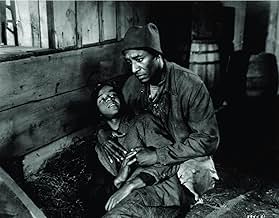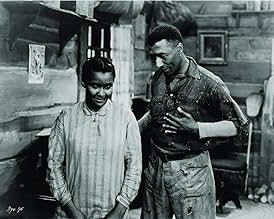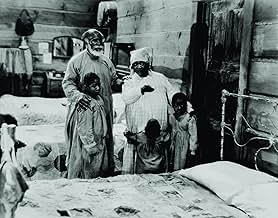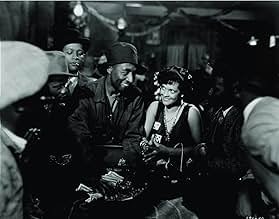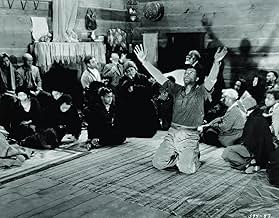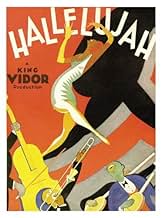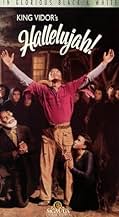IMDb RATING
6.7/10
2.1K
YOUR RATING
A sharecropper decides to become a preacher after falling for a vamp from the city.A sharecropper decides to become a preacher after falling for a vamp from the city.A sharecropper decides to become a preacher after falling for a vamp from the city.
- Nominated for 1 Oscar
- 3 wins & 1 nomination total
Matthew 'Stymie' Beard
- Child
- (uncredited)
Evelyn Pope Burwell
- Singer
- (uncredited)
Eddie Conners
- Singer
- (uncredited)
William Allen Garrison
- Heavy
- (uncredited)
Eva Jessye
- Singer
- (uncredited)
Sam McDaniel
- Adam
- (uncredited)
Clarence Muse
- Church Member
- (uncredited)
Featured reviews
"Hallelujah!" is fascinating from a film history perspective. King Vidor created the first Hollywood film with an all-black cast, and depicted in almost documentary fashion what life was like for poor blacks living in America's deep South. Alas, any interest the film held for me was purely academic -- as a film, it's otherwise rather boring.
The nominal plot focuses on Zeke, who lives with his large family and helps with their cotton-picking business. We watch him struggle with the demons that plague mortal man -- like gambling and horniness -- give into them, repent, give into them again, repent, and so on, until he comes back at the end to the family who loves him. Indeed, family and religion are the two dominant pillars around which these poor folk anchor themselves, much as they are in any culture. Much of the film consists of long scenes depicting a sermon, a baptism, a local dance. There are countless scenes of characters lifting their hands to heaven, praying to Jesus to guide them. It's all rather dramatically inert, and the film is too long. If you are religious yourself, I imagine these scenes might have a certain power to them. I found all of the weeping and wailing tiresome after a while.
Credit must go to Vidor, though, for even bothering to make this film at a time when much of America didn't care all that much about the black people. The movie is a memento of the role film can play in leading cultural progress.
Grade: C+
The nominal plot focuses on Zeke, who lives with his large family and helps with their cotton-picking business. We watch him struggle with the demons that plague mortal man -- like gambling and horniness -- give into them, repent, give into them again, repent, and so on, until he comes back at the end to the family who loves him. Indeed, family and religion are the two dominant pillars around which these poor folk anchor themselves, much as they are in any culture. Much of the film consists of long scenes depicting a sermon, a baptism, a local dance. There are countless scenes of characters lifting their hands to heaven, praying to Jesus to guide them. It's all rather dramatically inert, and the film is too long. If you are religious yourself, I imagine these scenes might have a certain power to them. I found all of the weeping and wailing tiresome after a while.
Credit must go to Vidor, though, for even bothering to make this film at a time when much of America didn't care all that much about the black people. The movie is a memento of the role film can play in leading cultural progress.
Grade: C+
There's something hypnotic about good preaching. All that passion, all that energy, whether it's in film or in person, has a cumulative power. It's hard to doubt the spreading power of religion when you see Daniel L. Haynes (this film) or Robert Duvall ("The Apostle"), or read the sermon at the end of "The Sound and the Fury." Feverishly, they try and communicate God's word. They rant, they rave, they speak quickly and with an undeniable amount of integrity. They get the crowd going, usually in whoops and outbursts, and one man's conversation with God becomes a community event. (Indeed, the power of a worked-up crowd is a powerful tool in and of itself).
That's what's so terrific about King Vidor's "Hallelujah." Everyone's up in arms about one thing or another in this movie, whether it's money, sex, or Jesus. Early in the film there's a rather ludicrous scene where the hero's brother is accidentally killed, due to the hero's folly and hubris. That's his Sin, for which he must Redeem Himself Before God. There's also a woman who represents Temptation, who leads him astray time and time again. In the end there's an extended chase through a swamp, that would be done again in Kurosawa's "Stray Dogs."
All of that's well and good, but the film really peaks during the sermon sequences. Done wrong, sermons in movies usually pass by unnoticed, or are used as a clothsline to hang lame jokes about apathetic churchgoers. Done right, as in this film, "The Apostle," and the most unusual ones in "Beloved," they can be as captivating as if you were really in attendance. It's a testament to the power of the motion picture.
That's what's so terrific about King Vidor's "Hallelujah." Everyone's up in arms about one thing or another in this movie, whether it's money, sex, or Jesus. Early in the film there's a rather ludicrous scene where the hero's brother is accidentally killed, due to the hero's folly and hubris. That's his Sin, for which he must Redeem Himself Before God. There's also a woman who represents Temptation, who leads him astray time and time again. In the end there's an extended chase through a swamp, that would be done again in Kurosawa's "Stray Dogs."
All of that's well and good, but the film really peaks during the sermon sequences. Done wrong, sermons in movies usually pass by unnoticed, or are used as a clothsline to hang lame jokes about apathetic churchgoers. Done right, as in this film, "The Apostle," and the most unusual ones in "Beloved," they can be as captivating as if you were really in attendance. It's a testament to the power of the motion picture.
I want to thank TCM for showing this movie and all others that wouldn't see the light of day. Yes this movie is crude in all phases of a movie coming together today. Since it took place in 1928 it's wonderful. My mother grew up down south in N.C. so yes a lot of Blacks were poor,picking cotton,living in shacks and finding release in either the church and or what was called the "devil's business" ,vice. The first time I saw this movie I wanted to cry, everything was so sad,and ugly but it held my interest. I hated how Zeke abandoned his family and I wanted them to hate him too.The "hootchie mama" Chick was very pretty and had a natural performing talent. I felt sorry for her when she died since she only wanted to be free. Funny thing about the movie is all over the U.S. the same story about Church,Sin, the Man of God, and the Heathen Woman is still going on.I love old movies with shaky film,missing dialouge,unskilled actors and all. It's a walking, talking bit of history unfolding before your eyes. I think as I watch the movie, did any of the actors make something of themselves? was anyone shunned for even doing this? did any church come out for the movie since I know many churches probably were against it. I saw the remark about it being racist and I disagree. It's a fact that Blacks sang as a release from the real world and all the misery that awaited them day after day. What would have been racist is if the actors had been White but in blackface. TCM showed this yesterday 10/5/04 and it's the 4th time I've seen it.I rate this 8/10.
Nina Mae McKinney portrayed Chick in this movie. The untrained, natural singing, dancing, acting talent stole everyone's heart who saw this movie, even till this day she's still winning hearts. A great actress, after this movie people named her "The Black Garbo" and "The Dark Clara Bow". Being the first black actress, she had to represent her race well, and show that Blacks could act, and show Hollywood that Blacks could hold their own on the silver screen. Norma Shearer, John Gilbert, Irving Thalberg, and King Vidor was breath-taken by her acting, and after her you saw many white actresses copying her style, the hands on the hips and facial expressions. This movie isn't stereotypical at all, its about Black Life in the South, the music and styles of the time. Nina Mae was promised many more movies, but never did anything else, but singing apperances, shorts, and maid apperances. But she did get to show her acting in the independent black movies. If you ever get to see them, you won't be sorry. People say this movie was ahead of its time, maybe so, But Nina was lucky she got to show all her talents, singing, dancing, comedy, and acting. Even Blacks don't get to show all of that today. People say that Lena Horne opened the doors, thats false, Nina Mae McKinney did, representing the Black race well, and showing that we could act, open the doors for Blacks in the future in Hollywood.
"Hallelujah" is a very interesting film. For that reason alone, it should be seen. It has an all-black cast and it was released in 1929, just as sound was first being used in films.
However, it is a very uneven production. We should give it some slack because of when it was produced, but not to mention its deficiencies would be dishonest. The acting, the lighting, the sound--all are uneven. Sometimes it is distracting, sometimes not.
Zeke (Daniel L. Haynes) is the central character. He lives with his large family, growing cotton. When the crop is harvested, he and his brother have it processed and baled. They deliver it to the riverboat and sell it on the dock. There in the city, with the money burning a hole in his pocket, he is introduced to some unscrupulous characters. He is naïve and obviously unaware of some basic rules of life and film: Never shoot with another man's dice. Never take a knife to a gunfight. And never, never go for a woman who gives her attentions to the highest bidder.
The story is filled with clichés and stereotypes, and it frequently drags. It has its compelling moments, like a chase through a swamp. But what bothers me most is the overly-dramatic acting. This is partly due to the fact that many of the scenes were couched in religious fervor. There are revival scenes, baptism scenes, scenes of general praying. In fact, the entire film is presented as a religious parable. Often when the characters speak, it is as if they are preaching. This interferes with the authenticity of the action, making some characters seem more caricatures than real people.
"Hallelujah" is a musical. Songs accent almost every scene. Most of them are gospel/spirituals. But the two best songs were written by Irving Berlin ("At The End of the Road" and "Swanee Shuffle").
However, it is a very uneven production. We should give it some slack because of when it was produced, but not to mention its deficiencies would be dishonest. The acting, the lighting, the sound--all are uneven. Sometimes it is distracting, sometimes not.
Zeke (Daniel L. Haynes) is the central character. He lives with his large family, growing cotton. When the crop is harvested, he and his brother have it processed and baled. They deliver it to the riverboat and sell it on the dock. There in the city, with the money burning a hole in his pocket, he is introduced to some unscrupulous characters. He is naïve and obviously unaware of some basic rules of life and film: Never shoot with another man's dice. Never take a knife to a gunfight. And never, never go for a woman who gives her attentions to the highest bidder.
The story is filled with clichés and stereotypes, and it frequently drags. It has its compelling moments, like a chase through a swamp. But what bothers me most is the overly-dramatic acting. This is partly due to the fact that many of the scenes were couched in religious fervor. There are revival scenes, baptism scenes, scenes of general praying. In fact, the entire film is presented as a religious parable. Often when the characters speak, it is as if they are preaching. This interferes with the authenticity of the action, making some characters seem more caricatures than real people.
"Hallelujah" is a musical. Songs accent almost every scene. Most of them are gospel/spirituals. But the two best songs were written by Irving Berlin ("At The End of the Road" and "Swanee Shuffle").
Did you know
- TriviaAlthough this film is frequently touted as the first black-cast film produced in Hollywood, it is actually predated by the more obscure Hearts in Dixie (1929).
- GoofsWhen Zeke confronts Chick and Hot Shot and strong-arms them in front of the crowd, the shadow of the microphone falls across Hot Shot as he is pushed to the background of the scene and tries to regain his composure. The shadow of the boom is also visible falling across the extras behind him.
- Alternate versionsMGM also issued this movie in a silent version, with Marian Ainslee writing the titles.
- SoundtracksSometimes I Feel Like a Motherless Child
(uncredited)
Traditional Spiritual
Sung offscreen during the opening credits
- How long is Hallelujah?Powered by Alexa
Details
- Runtime
- 1h 49m(109 min)
- Color
- Aspect ratio
- 1.20 : 1
Contribute to this page
Suggest an edit or add missing content


